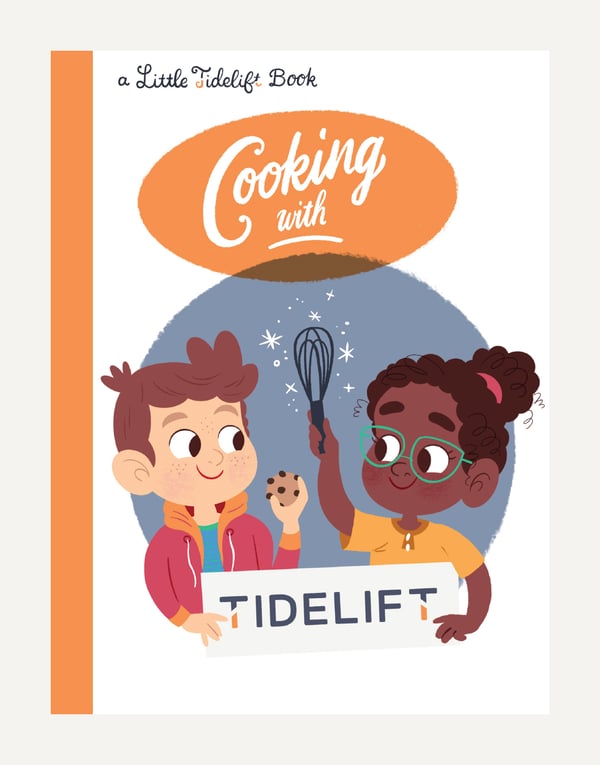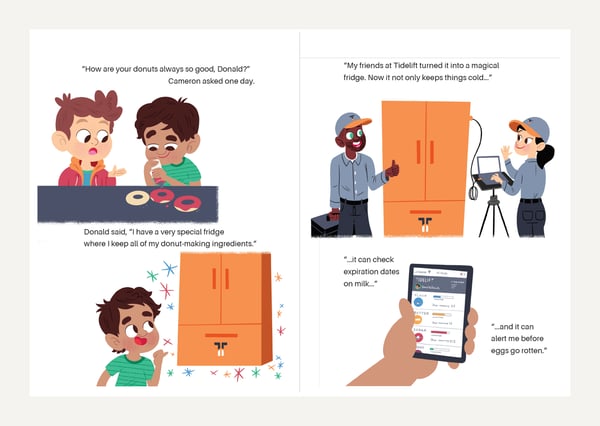Today is the day we are officially launching the first-ever Tidelift book. But rather than starting with a 300+ page O’Reilly-esque tome on the intricacies of open source license policy management, we decided to start modestly.
We wrote a children’s book.

It’s called Cooking with Tidelift. You can download it instantly as an ebook for your Kindle, iPad, or other favorite electronic book reader. In these weird, homebound pandemic times, maybe it will provide an interesting way to share your work with your children. Or if you don’t have kids at home, read it to your dog before bed, or share it with your nieces and nephews over Zoom.
Plus, if you register to speak with one of our open source experts, we'd be happy to send you an actual hold-it-in-your-hands book and Cooking with Tidelift apron to pair with it!
These are weird times. And weird times call for weird things like a children’s book about open source.
The story behind Cooking with Tidelift
So how did we come to write a children’s book?

Over the past year, I have spoken with a lot of people who develop applications for large enterprises using open source. In fact, almost all businesses are now using open source in some capacity for application development because of benefits like increased flexibility, greater developer satisfaction, lower total cost of ownership, and faster time to deployment.
Nevertheless, open source is not perfect, and I’ve heard several themes over and over during these conversations. Here are a few of them:
- My organization requires someone to provide support and maintenance for open source components.
- The reports we get from open source scanner tools are overwhelming and are slowing down developer productivity.
- These scanning reports are good at identifying issues, but don’t help with resolution.
- My organization needs help dealing with the complexities of open source license identification and policy enforcement.
- In fact, offloading open source complexities from developers’ plates in general, whether they are security, licensing, or on-going maintenance concerns, is the overarching theme of almost all of my conversations.

Today, great developers are in high demand, and the difference between keeping top developers and losing them to a competitor can come down to how good the organization is at eliminating monotonous, automatable, or simply boring tasks—so developers can stay focused on the interesting and compelling work that really matters to them—and the organization.
Managing the open source components that comprise the bulk of most modern applications can be tedious, frustrating, and technical work. Throughout this past year, I’ve spent a good part of my time helping non-technical employees understand the intricacies of how to manage open source software components effectively.
One way of explaining the importance of a managed open source approach seemed to really resonate: comparing the best practices for managing open source development in professional environments to the best practices for commercial food production.
Simply put, open source components are like the ingredients of a recipe. As we know, open source allows you to start with building blocks rather than developing from scratch, much like cooking in the kitchen. Apart from some extreme farm-to-table restaurants, we don’t start a chicken sandwich by raising the chicken, growing the wheat, and harvesting the lettuce. We start by purchasing the ingredients from a store.
When preparing food at the commercial level however, we can’t simply wander into the backyard and start picking ingredients. If this food is going to be consumed by hundreds to thousands to millions of consumers, we need to start with known-good ingredients, and we need assurances about the quality and safety of those ingredients if we are going to put them in the food we make for our customers.
And that’s where we got the idea for Cooking with Tidelift.
So we wrote the story and hired the talented children’s book illustrators Ashley and Joel Selby to bring it to life. Hopefully this provides you with a way to teach your kids, friends, partners, grandparents—or co-workers—the basic concepts behind managed open source, and the importance of securing and maintaining the open source components you rely on.
Most of all, I hope it brings a smile to your face during these crazy times.
Fill out the form below to instantly receive your ebook!


 50 Milk St, 16th Floor, Boston, MA 02109
50 Milk St, 16th Floor, Boston, MA 02109